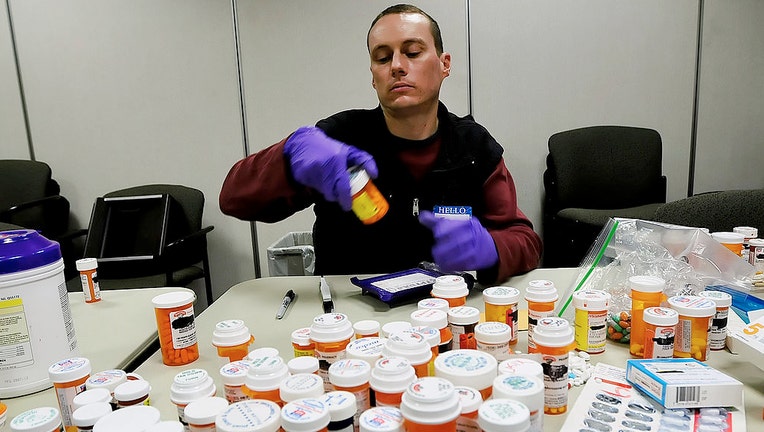Medicare negotiating with drugmakers on prices for expensive medications

FILE-A pharmacist with CVS counts and sorts unused prescription drugs at a hospital. (Photo by Shawn Patrick Ouellette/Portland Press Herald via Getty Images)
Medicare is negotiating with pharmaceutical companies to lower prices for 10 prescription drugs to make them affordable for millions of recipients of Medicare.
According to the New York Times, drug companies are starting discussions with the federal government as some organizations are suing the Biden administration, claiming that a new law authorizing the negotiations is unconstitutional.
Drug price negotiations are happening as the CEOs of the three drugmakers appear before the Senate Health, Education, Labor, and Pensions (HELP) on Thursday.
RELATED: First drugs picked to be targeted for Medicare price negotiations
Joaquin Duato of Johnson & Johnson, Robert Davis of Merck, and Chris Boerner of Bristol Myers Squibb are testifying before the committee to discuss why the U.S. pays the highest prices in the world for prescription drugs.
Which prescription drugs is Medicare trying to negotiate lower prices?
The first 10 prescription drugs that will be subject to Medicare price negotiations are
- Eliquis, a blood thinner from Bristol Myers Squibb and Pfizer
- Xarelto, a blood thinner from Johnson & Johnson
- Januvia, a diabetes drug from Merck
- Jardiance, a diabetes drug from Boehringer Ingelheim and Eli Lilly
- Enbrel, a rheumatoid arthritis drug from Amgen
- Imbruvica, a drug for blood cancers from AbbVie and J&J
- Farxiga, a drug for diabetes, heart failure and chronic kidney disease from AstraZeneca
- Entresto, a heart failure drug from Novartis
- Stelara, a drug for psoriasis and Crohn’s disease from J&J
- Fiasp and NovoLog, diabetes drugs from Novo Nordisk
This marks a first step in the Biden administration’s efforts to lower prescription drug costs for Americans.
"Medicare is negotiating for lower prices on drugs to treat everything from diabetes, Crohn’s disease, arthritis, heart disease, cancer, and more. Just one of these drugs alone can cost as much as $6,500 in out-of-pocket costs for seniors," President Joe Biden said in a Feb. 1 White House statement.
RELATED: Medicare: These medications could be subject to price controls
"Through my Inflation Reduction Act, we’re working to give seniors the best possible deal on their prescription drugs and lower health care costs. Already, we’ve cut insulin costs to $35 for seniors and people with disabilities, 15 million Americans are saving an average of $800 per year on health insurance costs, and seniors’ out of pocket drug costs will be capped at $2,000 starting next year. The days where Americans pay two to three times what they pay for prescription drugs in other countries are ending."
Biden administration officials told USA Today that the first offers will start talks with drugmakers during the spring and summer.
Separately, final prices for the first collection of drugs will be made public on Sept. 1, and the negotiated prices will take effect in January 2026, USA Today reported.
RELATED: Millions of Americans can't obtain promising new weight loss drugs because Medicare won't pay
Another 30 drugs will be selected over the next two years for negotiated prices, with a roll out set for 2027 and 2028 under the Inflation Reduction Act.
What is Medicare?
Medicare is a federal insurance program for people who are 65 years old and older, certain younger people with disabilities, and people with End-Stage Renal Disease (permanent kidney failure requiring dialysis or a transplant, sometimes called ESRD).
According to the Centers for Medicare and Medicaid Services, Medicare provides health insurance coverage to more than 65 million people in the U.S.
Sen. Bernie Sanders releases report critical of drugmakers
Earlier this week, Vermont Sen. Bernie Sanders released a report on Tuesday detailing what he deemed a rigged system that lets drugmakers charge Americans higher prices for prescription drugs, WCAX-TV in Vermont reported.
Sanders initially threatened to issue the committee’s first subpoenas to urge the CEOs of Johnson & Johnson and Merck to testify, and they voluntarily agreed in January to appear at the hearing.
The senator’s report brings attention to the cost of three prescription drugs that cost more in the U.S. than in other countries.
RELATED: Biden administration proposes new rules to push insurers to increase mental health coverage
Some of the drugs listed are Bristol Myers Squibb’s Eliquis, which is $7,100 in the U.S. but less than $1,000 in Japan, Canada, Germany and the U.K.
According to the report, Johnson & Johnson made twice as much selling the arthritis treatment Stelara in the U.S. ($30.4 billion) as it did in the rest of the world ($14.9 billion) since 2016.
Since 2015, Merck earned $43.4 billion selling the cancer drug Keytruda in the U.S. compared to $30 billion in the rest of the world.
And Bristol Myers Squibb raked in $34.6 billion selling the blood thinner Eliquis in the U.S. compared to $22.5 billion in the rest of the world, meaning that the U.S. accounts for nearly two-thirds of all global Eliquis sales since its launch.
Under the Inflation Reduction Act, drug companies that increase prices faster than inflation now have to pay a rebate to Medicare, which is translating into lower out-of-pocket costs for seniors, as Medicare has begun directly lowering co-pays for drugs whose price has increased beyond inflation, according to a White House fact sheet.
This story was reported from Washington, D.C.

